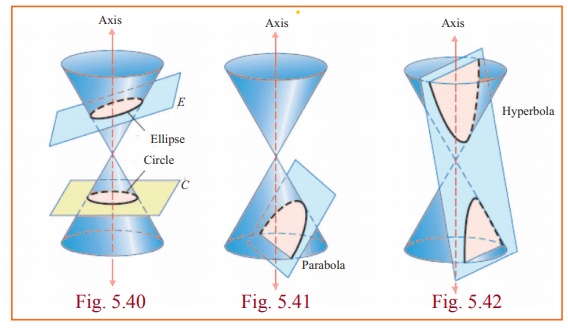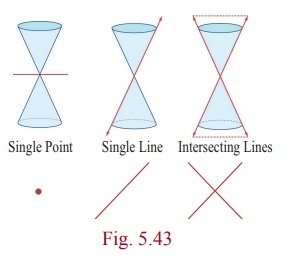Chapter: 12th Mathematics : UNIT 5 : Two Dimensional Analytical Geometry II
Conic Sections
Conic
Sections
In addition to the method to determine the curves discussed in Previous Section, geometric description of a conic section is given here. The graph
of a circle, an ellipse, a parabola, or a hyperbola can be obtained by the
intersection of a plane and a double napped cone. Hence, these figures are
referred to as conic sections or simply conics.
1. Geometric description of conic section
A plane perpendicular to the axis of the cone (plane C )
intersecting any one nape of the double napped cone yields a circle (Fig. 5.40)
. The plane E , tilted so that it is not perpendicular to the axis,
intersecting any one nape of the double napped cone yields an ellipse (Fig.
5.40). When the plane is parallel to a side of one napes of the double napped
cone, the plane intersecting the cone yields a parabola (Fig. 5.41). When the
plane is parallel to the plane containing the axis of the double cone,
intersecting the double cone yields a hyperbola (Fig. 5.42).

2. Degenerate Forms
Degenerate forms of various conics (Fig. 5.43) are either a point
or a line or a pair of straight lines or two intersecting lines or empty set
depending on the angle (nature) of intersection of the plane with the double
napped cone and passing through the vertex or when the cones degenerate into a
cylinder with the plane parallel to the axis of the cylinder.
If the intersecting plane passes through the vertex of the
double napped cone and perpendicular to the axis, then we obtain a point or a
point circle. If the intersecting plane passes through a generator then we
obtain a line or a pair of parallel lines, a degenerate form of a parabola for
which A = B = C = 0 in general equation of a conic and if
the intersecting plane passes through the axis and passes through the vertex of
the double napped cone, then we obtain intersecting lines a degenerate of the
hyperbola.

Remark
In
the case of an ellipse (0 < e < 1) where e =  . As e → 0, b/a → 1 i.e., b → a or the lengths of the minor and major axes are close in size.
i.e., the ellipse is close to being a circle. As e → 1, b/a → 0 and the ellipse degenerates into a line segment i.e., the
ellipse is flat.
. As e → 0, b/a → 1 i.e., b → a or the lengths of the minor and major axes are close in size.
i.e., the ellipse is close to being a circle. As e → 1, b/a → 0 and the ellipse degenerates into a line segment i.e., the
ellipse is flat.
Remark
In
the case of a hyperbola (e > 1) where e =  . As e → 1, b/a → 0 i.e., as e → 1, b is very small related to a and the
hyperbola becomes a pointed nose. As e → ∞ , b is very large related to a and the hyperbola becomes flat.
. As e → 1, b/a → 0 i.e., as e → 1, b is very small related to a and the
hyperbola becomes a pointed nose. As e → ∞ , b is very large related to a and the hyperbola becomes flat.
3. Identifying the conics from the general equation of the conic Ax2 + Bxy + Cy2 + Dx + Ey + F = 0 .
The graph of the second degree equation is one of a circle,
parabola, an ellipse, a hyperbola, a point, an empty set, a single line or a
pair of lines. When,
(1) A = C = 1, B = 0, D = −2h,
E = −2k, F = h2 + k 2
− r2 the general equation reduces to(x − h)2
+ ( y − k )2 = r2 , which is a
circle.
(2) B = 0 and either A or C = 0 , the general equation
yields a parabola under study, at this level.
(3) A ≠ C and A and C are of the
same sign, the general equation yields an ellipse.
(4) A ≠ C and A and C are of
opposite signs, the general equation yields a hyperbola
(5) A = C and B = D = E = F = 0 ,
the general equation yields a point x2 + y2
= 0 .
(6) A = C = F and B = D = E = 0 ,
the general equation yields an empty set x2 + y2
+1 = 0 , as there is no real solution.
(7) A ≠ 0 or C ≠ 0 and others are zeros, the general equation
yield coordinate axes.
(8) A=-C and rests are zero, the general equation yields a pair
of lines x2 − y2 = 0 .
Example 5.26
Identify the type of the conic for the following equations:
(1) 16 y2 = −4x2 + 64
(2) x2 + y2 = −4x − y
+ 4
(3) x2 − 2 y = x + 3
(4) 4x2 - 9 y2 -16x +18
y - 29 = 0
Solution

Related Topics